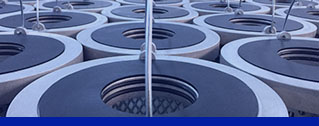
Filters are a small but important part of hydraulic machinery, though serving no mechanical purpose they're integral to the proper functioning of the machine and to prolonging the energetic lifetime of the equipment and the hydraulic fluid which drives it. The position of a filter is to take away and/or contain particles of contamination and preserve the fluid that flows round the machine clear. Any contamination within the oil could cause damage to shifting elements additional downstream, and this can lead to seizing up of moving elements, corrosion of other elements and expensive replacements. Once we consider the results of not using a filter, the importance of these little objects becomes extra important.
Â
There are two predominant kinds of hydraulic oil filter – surface and depth filters. The surface filter, because the title suggests, removes contamination from the floor of the oil and may be useful in applications where gravity feeds the oil via a space appropriate for such a filter throughout operation. A depth filter might be submerged in a reservoir or chamber and will remove particles from everything of the physique of fluid. Depth filters due to this fact, are simpler and will retain a bigger amount of contamination and undesirable particles before they should be cleaned or replaced.
Â
The supplies used to make hydraulic filters varies, as does the associated fee accordingly. Glass filters are costlier but they're more environment friendly, especially when glass fibres are utilized in a depth filter. Glass can also be non-reactive, meaning it may be used with any type of hydraulic fluid. Steel filters are also moderately efficient, but they can't be used with all sorts of hydraulic fluid, as a consequence of incompatibilities between sure hydraulic oils and a few metals. The place it is acceptable to use a steel filter there's the option of a magnetic filter system, which works as a depth filter and makes use of a magnetic charge to attract metallic particles which will have entered the fluid system. If the hydraulic equipment is utilized in metal working and fabrication then the prospect of potential contamination being from metallic particles is high; magnetic filters will take care of this contamination while another kind of filter can be used to deal with different varieties of pollution.
Â
Cellulose or paper can also be used to make a hydraulic fluid filter, but these have a short life expectancy and want frequent alternative. They are cheaper than the other varieties, however might find yourself costing extra in the long term, as a consequence of common downtime Browse this site for substitute and the potential harm to equipment if they aren't changed typically enough.
Â
It might appear to be glass is your best option; regardless of costing somewhat more it does the perfect job and won't need changing too typically. The disadvantage of a glass filter is actually its strength as effectively; the superior filtering ability can really lead to a drop in pressure, within the system, which is often undesirable. It is very essential, subsequently, to test how a drop in hydraulic system stress will have an effect on productiveness and performance in case you are considering switching to glass filters from one other materials sort. Think about also whether or not this drop in strain is likely to result in pointless changes of pressure relief valves, resulting in probably harmful build ups of stress elsewhere.
Â
The options of hydraulic oil filters don't end after materials type and building, as there's nonetheless the issue of rankings and specifications to deal with. All filters have an ISO 4406 ranking, and the lower the code of any given filter, the better it's at eradicating contamination. Hydraulic filters may have a beta ratio, which is the ratio of particles discovered upstream of the filter divided by the quantity found downstream. For beta ratios, the upper it's the higher, and this may also be used to present a share for effectiveness.
Â
It can be important to examine that the circulation rate of the filter is appropriate with the circulate rate of the equipment it is for use in; too fast and the filter won't be able to effectively take away contamination, too sluggish and it may turn into clogged quickly. The operational strain of the hydraulic system is also important, as the filter should be able to stand up to that power for a chronic period of time. The ultimate thing to examine is that the filter can be linked to the gear, so examine the port dimension of the filter and guarantee it's suitable with the equipment in the location it is to be fitted.
Â
There's a lot to think about right here, but choosing the most suitable hydraulic fluid filter is an train that it's worth spending some time on, as it can make a giant distinction to the efficiency and lifespan of your hydraulic equipment and save on downtime and alternative prices in the long term.